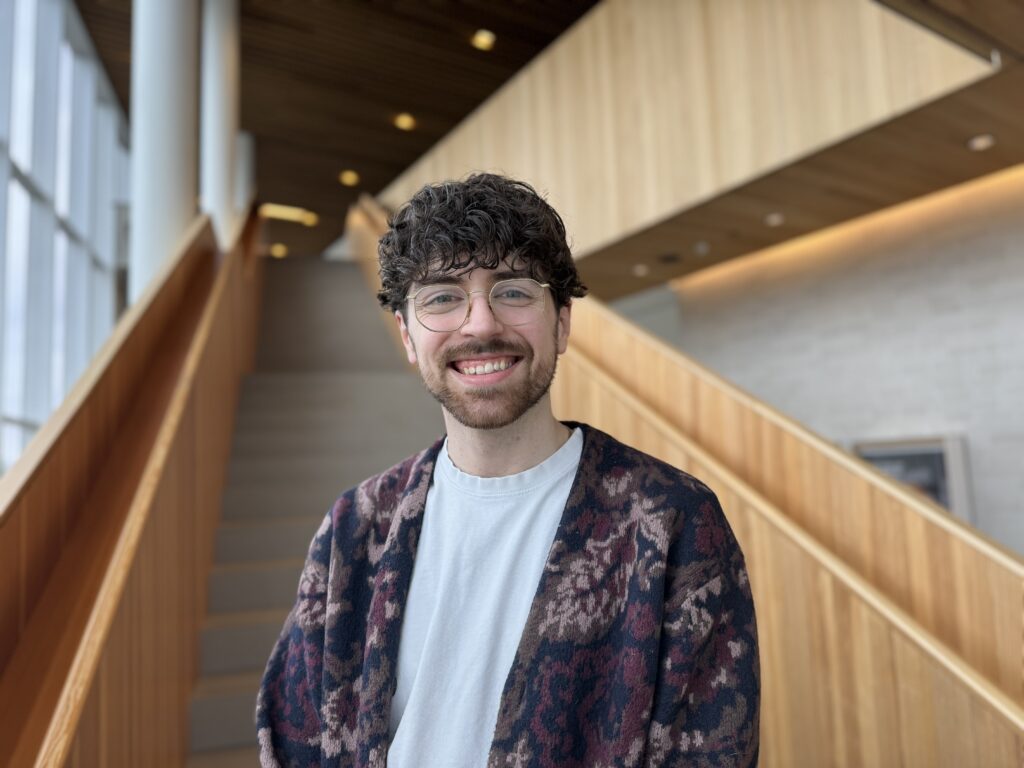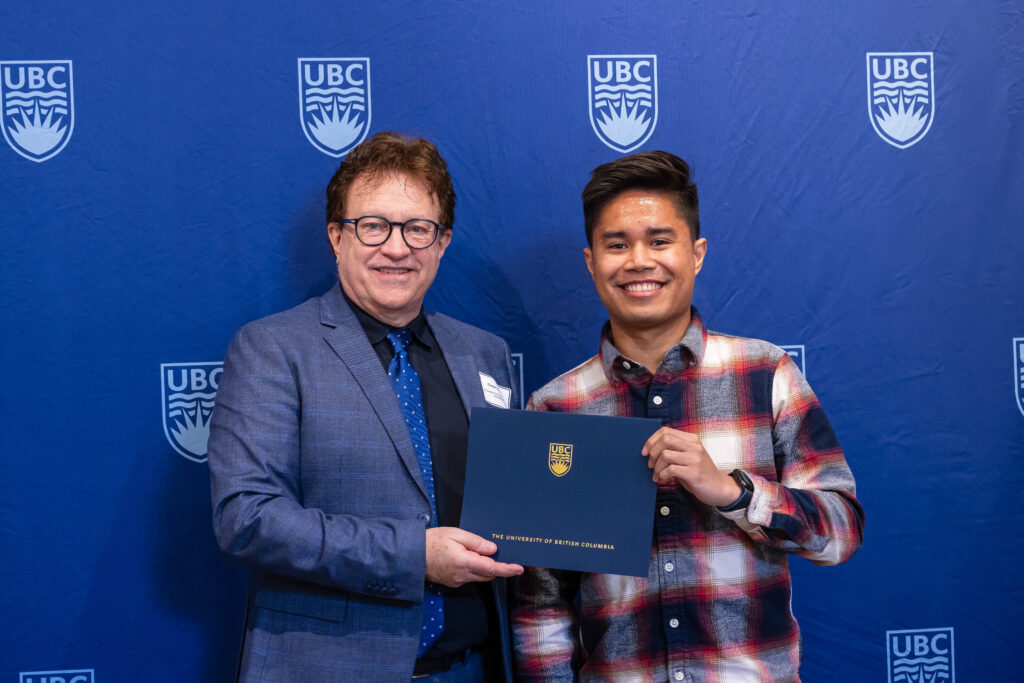Congratulations to the School of Biomedical Engineering’s Fraser Douglas from Dr. Calvin Kuo’s Human Motion Biomechanics Lab and Thristan Taberna from Dr. Peter Zandstra’s Stem Cell Bioengineering Lab for being awarded the UBC Killam Graduate Teaching Assistant Awards. The award recognizes excellence in teaching and is given to 19 Graduate Teaching Assistants at UBC every year.

Fraser Douglas – On teaching with enthusiasm
Fraser Douglas approaches teaching with the goal to inspire curiosity. One of his early memories of being inspired in teaching came from his high school physics teacher, saying “My teacher was the definition of a mad scientist, always creating his own experiments to demonstrate concepts to the class. For example, to explain momentum to us, one day he brought us outside where he had gathered a collection of decommissioned fire extinguishers fixed to a chair with wheels. Setting off the extinguishers the chair was sent flying across the grass in a plume of foam as he proudly proclaimed ‘Momentum!’. Truly an unforgettable lesson”.
This passion for science ultimately led Fraser to complete his undergraduate and graduate degrees in Electrical and Mechanical Engineering in Scotland, integrating biomedical engineering elements throughout his self-led projects. In 2021, this interest in biomedical engineering, specifically wearable technologies, led him to UBC to pursue a PhD in Dr. Calvin Kuo’s Human Motion Biomechanics Lab. Fraser mentions that he was initially drawn to SBME at UBC given the department’s numerous connections to hospitals across Vancouver.
Now, Fraser’s research focuses on the use of wearable sensors to better quantify stroke recovery progress for patients, working on improving the muscle activity-sensing technology’s robustness such that it may soon see clinical adoption and allow for unparalleled insights when seeking to better understand the stroke recovery process.
Fraser has also been involved with creating the course materials for the new NSERC CREATE graduate Care Anywhere program. In this, “he acts as a voice for the students in the program, helping us make decisions that will be in the best interests and of most benefit to the students. Fraser has been instrumental in building connections to assign mentors (from industry, academia, or medicine) to each of our students to help provide guidance and support to their diverse individual career goals. While most mentoring programs will pair mentors on an availability basis, Fraser has gone above and beyond by trying to match students with mentors based on student goals, personally reaching out to mentors to ask them to participate in the program on behalf of the students and forming connections with companies including Garmin and Ossur in the process” comments Dr. Calvin Kuo.
He has also had the opportunity to learn from some key faculty’s teaching styles at SBME, and has learned a lot TA’ing in Dr. Robyn Newell’s second year biomechanics course and Dr. Negar Harandi’s third year biomedical instrumentation course about how to build rapport with students, inspire enthusiasm for the course material, and ultimately teach the students foundational skills.
In all, Fraser said “I really do wish to continue in academia and become a fully fledged instructor, and so this award means the world to me as it shows I am on the right path. I would like to thank everyone, students, faculty, and colleagues alike, that have and continue to support me in my pursuits.”

Thristan Taberna – On mentoring and the future of research
“Receiving this award is motivational. It’s rewarding working with students in the classroom,” comments Thristan Taberna. Thristan’s teaching philosophy is rooted in the integration of engineering design principles with empathy-based teaching approaches where curiosity is encouraged, diversity is celebrated, and every voice is valued. He approaches instructional challenges with innovative solutions to ensure students stay on track.
Thristan has experience as a teaching assistant in multiple courses, but his favourite TA experience was in BMEG 371: Transport Phenomena within Cells and Tissues. When he started TAing this course, he noticed a disparity in students’ knowledge of prerequisite math skills. He proactively addressed the gradient in students’ math backgrounds by surveying them at the beginning of the semester and then provided targeted guidance through tutorial sessions to ensure that all students had the necessary foundation to excel in the course. The approach was a success academically, but also ensured that students felt like they had a supportive learning environment. The student reviews once the course was complete all clearly emphasized gratitude to this approach with one student stating, “I really appreciate how much time and effort he put into helping us learn the material and succeed in assignments. I learned more from his tutorials than in the entire rest of the course. He was extremely engaging and framed things in a way that was easy to understand.”
“Thristan’s teaching style combines engineering and technical rigour while really caring about student learning. His leadership style makes a powerful impact on the students he teaches by showing them how to build consensus and work towards shared goals which is a valuable asset in the lab,” shares Dr. Peter Zandstra. Thristan moved to Vancouver for the opportunity to do research in the Stem Cell Bioengineering Lab run by one of his mentors, Dr. Peter Zandstra, after being fascinated by the research happening in the lab. Thristan’s research focuses on developing a scalable bioprocess to produce off-the-shelf T cell immunotherapies using pluripotent stem cells (PSCs). The current vein-to-vein model for chimeric antigen receptor (CAR) T-cell therapy is expensive, inaccessible, and variable. The new process that Thristan is working on has the potential to drive down the cost of CAR T-cell therapy making it more accessible to patients.
His passion for stem cells has also led him to inspire a younger generation of scientists. In 2023, Thristan and a group of students from StemCellTalks Vancouver hosted 200 high school students at UBC for a day of talks and hands-on experiments to get them excited about stem cell research.
Thristan is also just as excited about the opportunities that await him in the future. “What really excites me is the ability to engineer cells by using synthetic biology as well as engineering their environment to produce more effective therapies. The landscape at UBC with SBME’s new building and all the partnerships between industry and academia provide endless possibilities.”